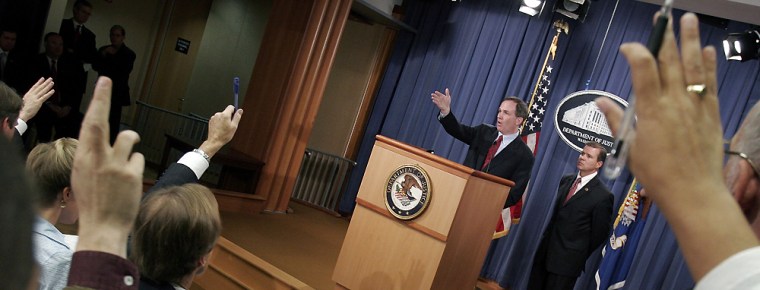Special counsel Patrick Fitzgerald’s first charges in the White House leak case don’t get to the heart of his two-year probe: the leak.
The indictment of vice presidential adviser I. Lewis “Scooter” Libby Jr. is built on charges of obstruction of justice, making false statements and perjury — and it will rest primarily on testimony from a handful of Washington reporters.
“In some ways it seems less satisfying,” said Michael Cahill, a Brooklyn Law School professor, adding that false statements might have impeded the probe into whether top Bush administration officials knowingly revealed the identity of CIA agent Valerie Plame.
Steven Reich, a New York attorney and former senior associate counsel to President Bill Clinton, said Fitzgerald has his reasons for not charging anyone with the leak. “Either he thought there was not a crime, or he thought he couldn’t prove it. No one will know which but him,” he said.
It may have been smart strategy, however, for the prosecutor to go with safer charges, considering the stakes in investigating the highest levels of the White House.
Indictment is ‘very provable’
“Perjury and false statement can be remarkably easy to prove,” said Andrew D. Levy, a criminal defense lawyer in Baltimore who teaches at the University of Maryland. “So often it’s the cover-up that ensnares people.”
Levy said the indictment is “very narrow, very focused: it follows, very provable.”
The indictment alleges that Libby lied about his conversations with reporters. Witnesses at the trial will likely include Tim Russert of NBC News, Matt Cooper of Time Magazine and New York Times reporter Judith Miller, all of whom testified before the grand jury that returned Friday’s indictment.
Erwin Chemerinsky, a Duke Law School professor, said it is not unusual for criminal probes to change their focus.
“What brought down the Nixon administration wasn’t the burglary itself, but the cover-up of it,” Chemerinsky said, adding that what caused Clinton’s impeachment “wasn’t that he had an affair with Monica Lewinsky but he lied about it.”
Charges similar to Martha Stewart’s
The charges in the Friday indictment are similar to the ones used in Martha Stewart’s criminal case. She was convicted last year for obstructing justice and lying about why she sold ImClone Systems stock just before a negative government decision on an ImClone drug. She served a five-month prison term followed by home confinement.
“Very rarely do obstruction of justice cases and perjury cases come as neatly tied as Martha Stewart’s.... It is by no means a slam dunk,” said Viet Dinh, a law professor at Georgetown University and former Justice Department lawyer in the Bush administration.
The prosecutor must prove beyond a reasonable doubt that Libby “knowingly and willfully” made false statements and lied to the grand jury. He could claim that any misstatements were not intentional.
“These are sophisticated people,” Mark A. Godsey, a University of Cincinnati law professor, said of the top White House advisers. “Playing dumb, the jury might not buy that. At the same time they’re extremely busy. Are they in the loop or not in the loop?”
Libby, a Columbia University law school graduate, has not been in trouble before.
“Although it always helps a criminal defendant not to have a criminal record, a D.C. jury will be open to the idea that politicians are willing to lie,” said Gabriel J. Chin, a criminal law professor at the University of Arizona.
